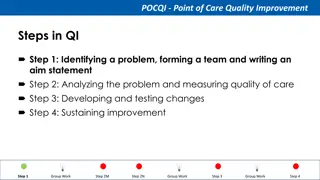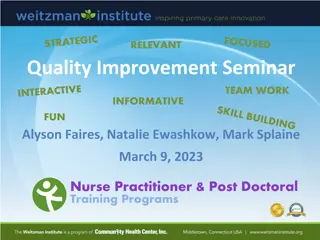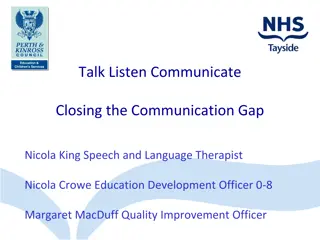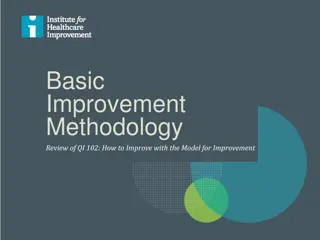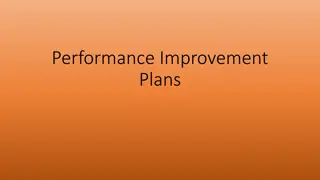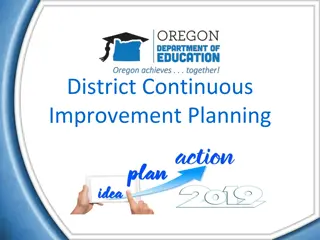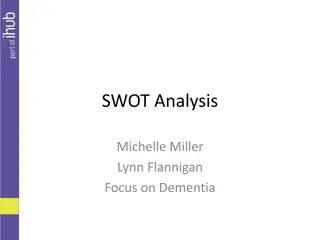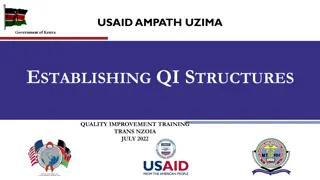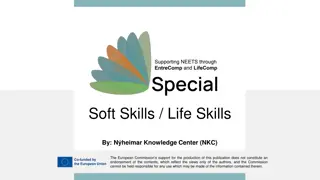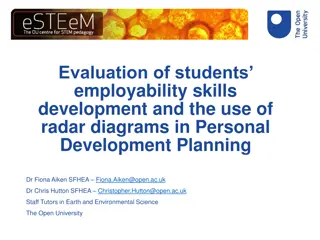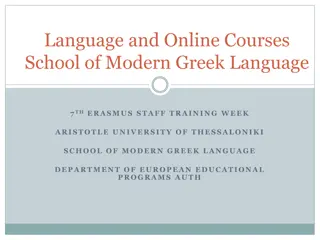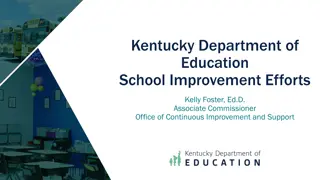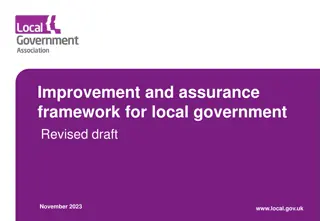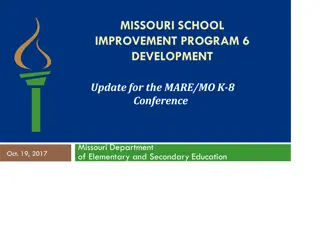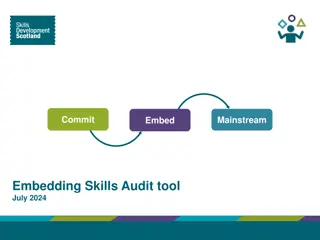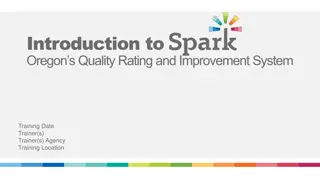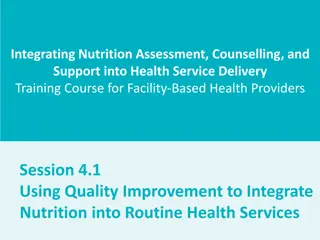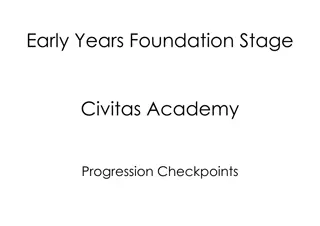Language Study Community – Enhance Your Language Skills
Joining a Language Study Group is a fantastic way to take your language learning to the next level. By leveraging the power of Group Study, you can immerse yourself in the language, enhance your understanding, and build confidence in your speaking abilities. Read full article \/\/explainlearning.com
1 views • 3 slides
Academic Language Demands and Supports in Instructional Planning
Academic Language Demands and Supports are crucial in educational settings to ensure comprehension and usage of language by students. This content discusses embedding language demands in lesson plans, providing language supports, and peer review activities to enhance academic language skills. The fo
6 views • 10 slides
The Significance of Media in Language Learning
Media plays a crucial role in language learning by raising awareness of the ideology behind linguistic structures and providing valuable information on society and culture. Linguists are drawn to media language for research purposes and to understand its impact on language use and attitudes. Media s
12 views • 5 slides
Understanding Translation: Key Concepts and Definitions
Translation involves transferring written text from one language to another, while interpreting deals with oral communication. Etymologically, the term "translation" comes from Latin meaning "to carry over." It is a process of replacing an original text with another in a different language. Translat
11 views • 76 slides
Importance of Teaching Life Skills for Healthy Child Development
Life skills education plays a crucial role in promoting healthy child and adolescent development by enhancing adaptive behavior, problem-solving abilities, and social skills. It encompasses three core areas: thinking skills, social skills, and emotional skills. Teaching life skills is essential for
4 views • 15 slides
Point of Care Quality Improvement (POCQI) Steps in Quality Improvement
POCQI involves four key steps: identifying a problem, analyzing the problem, developing and testing changes, and sustaining improvement. It emphasizes reviewing data, prioritizing problems, forming effective teams, and writing clear aim statements. Teamwork is crucial for healthcare improvement as i
0 views • 62 slides
Quality Improvement Strategies for Stakeholder Engagement
Dive into the world of quality improvement with a focus on stakeholder engagement at the upcoming seminar led by Alyson Faires, Natalie Ewashkow, and Mark Splaine. Learn about effective conflict management, stakeholder considerations, and more through interactive sessions and insightful discussions.
2 views • 28 slides
Closing the Communication Gap for Child Development
Addressing the communication gap is crucial in bridging the educational disparity between disadvantaged and privileged children. The initiative focuses on enhancing language skills, adult-child interactions, and early literacy through evidence-based strategies and activities. Training sessions aim t
0 views • 28 slides
Improving Quality with the Model for Improvement
In this content, we delve into the Model for Improvement methodology, focusing on key aspects such as setting aims, choosing measures, developing and testing changes. It discusses the three questions in the Model, elements of an effective aim statement, types of measures, and utilizing change concep
1 views • 27 slides
Enhancing Language Learning Across the Curriculum in B.Ed. 1st Year Course
Language Across the Curriculum (LAC) emphasizes that language learning should occur across all subjects, not just in language classrooms. It highlights the importance of incorporating language development into every learning activity, fostering multilingualism in schools. Language plays a crucial ro
2 views • 34 slides
Integrated Language Tests and Assessments Overview
This content delves into integrated language tests and assessments, exploring the differences between separate skills tests and integrated tests. It covers the rationale behind integrating language skills, examples of integrated skills tests, as well as shortcomings to avoid in test design. Key aspe
2 views • 35 slides
Utility Performance Improvement Strategies
Effective utility performance improvement involves benchmarking, selecting key performance indicators (KPIs) aligned with strategy, developing improvement plans, and implementing initiatives to achieve targets. This process entails identifying focus areas, setting improvement targets, and implementi
0 views • 37 slides
ARHOME: Arkansas Health & Opportunity for Me Demonstration Project
The ARHOME project in Arkansas aims to improve health outcomes and economic independence by transitioning Medicaid recipients to private insurance while maintaining eligibility and federal funding. With measurable goals focused on health improvement and poverty reduction, ARHOME seeks to drive quali
0 views • 16 slides
Exploring Word Frequency and Usage Patterns in English Language Learning
Dive into the world of word frequency and usage patterns to enhance your English language skills. Discover the significance of common words, their placement, and examples that illustrate their meanings. Uncover the attraction of simplicity in language learning and how it impacts comprehension and re
0 views • 23 slides
Speech and Language Developmental Milestones: A Bilingual/Multilingual Perspective
Speech and language developmental milestones are crucial for children, regardless of their home language. These milestones encompass receptive language, expressive language, pragmatics, and articulation and phonology. Understanding how a child hears and talks from birth to one year is essential, as
1 views • 23 slides
Analyzing Writer's Language Use in English Language GCSE Component 2
In English Language GCSE Component 2, students learn to analyze how writers use language. The learning objective focuses on commenting, explaining, and analyzing language use with relevant subject terminology. The exam assesses students on their ability to interpret and explain a writer's thoughts,
0 views • 12 slides
Oregon District Continuous Improvement Planning Process
Explore the key components of Oregon's district continuous improvement planning process, including objectives, executive memos, ODE commitments, and the essential elements that all Oregon districts must incorporate into their continuous improvement plans. Learn about the shifts in the overarching vi
0 views • 9 slides
Language Education in Diverse Indian Contexts: Strategies and Challenges
The content explores various aspects of language education, focusing on language pedagogy, multilingualism, language skills teaching, assessment processes, and addressing diverse learner needs in the Indian educational context. It emphasizes the importance of integrating skills for literacy and lang
0 views • 23 slides
Quality Improvement Strategies for Dementia Care Enhancement
Explore the importance of improvement initiatives in dementia care through SWOT analysis, experience sharing, and fundamental concepts. Discover why adaptability is key to survival and how quality improvement differs from research and performance. Learn about executing QI ideas, the Model for Improv
0 views • 23 slides
The Direct Method in Language Teaching
The Direct Method, also known as the DM, emphasizes teaching the target language without translation. It aims to improve students' communication skills and focus on vocabulary and pronunciation over grammar. Teachers play a direct role in class activities, while students engage in interactive langua
0 views • 8 slides
Introduction to Language Technologies at Jožef Stefan International Postgraduate School
This module on Knowledge Technologies at Jožef Stefan International Postgraduate School explores various aspects of Language Technologies, including Computational Linguistics, Natural Language Processing, and Human Language Technologies. The course covers computer processing of natural language, ap
0 views • 27 slides
Enhancing Quality Improvement in Health and Social Care
Explore how to support innovation and improvement at all levels within the Health and Social Care sector through the Quality Attributes Framework (QAF). Discover eLearning programs, face-to-face courses, and consultancy services aligned with the framework to drive quality improvement. Put people fir
0 views • 22 slides
Exploring Sociolinguistics: Language Variation and Social Factors
Sociolinguistics delves into the study of language variation influenced by social factors, examining the relationship between language and its social context. It explores various aspects like standard pronunciation, language choice, speech acts, language components, language variety, and factors suc
0 views • 73 slides
Understanding Assembly Language Programming for Computing Layers
Assembly language is a low-level programming language that enables direct interaction with a computer's hardware components. This content explores the fundamentals of assembly language, the relationship between human-readable machine language and binary code, an assembly language program for multipl
0 views • 31 slides
Establishing Quality Improvement Structures in Healthcare Settings
Learn about the importance of Quality Improvement Teams (QITs) and Work Improvement Teams (WITs) in healthcare facilities, their formation processes, roles, and responsibilities. Discover how QITs and WITs contribute to enhancing decision-making, commitment to quality improvement, and overall health
0 views • 35 slides
Soft Skills and Life Skills Overview
Soft skills, also known as life skills or people skills, encompass interpersonal and social abilities that enable effective interaction with others. They are acquired through daily life experiences and reflections, in contrast to hard skills gained through formal education. This overview delves into
0 views • 36 slides
Evaluation of Students' Employability Skills Development Using Radar Diagrams in Personal Development Planning
This study focuses on assessing students' employability skills development through the use of radar diagrams in Personal Development Planning (PDP). The research evaluated students' self-assessment and reflection on skills improvement with a specific focus on collaborating with others and self-refle
0 views • 18 slides
Understanding Language Anxiety in Foreign Language Learning and Teaching
Explore the impact of language anxiety on students and teachers in foreign language learning and teaching contexts through insights from Dr. Christina Gkonou's research. Delve into the theoretical background, implications for language education, and real-life experiences shared at the Essex Language
0 views • 25 slides
Understanding Language Development in Children with Assistive Technology
Explore the nuances of speech vs. language development in children, focusing on the benefits of using alternative language modes such as signs, pictures, and gestures. Delve into the definition of language and speech, set the stage for discussions around assistive technology, and learn about the imp
0 views • 40 slides
School of Modern Greek Language: Courses, Seminars, and Assessment Overview
Explore the School of Modern Greek Language at Aristotle University of Thessaloniki offering language courses, seminars for teachers, and assessment exams. Founded in 1970, the school provides a multicultural environment for students worldwide, emphasizing Greek culture and offering a variety of lan
0 views • 17 slides
Kentucky Department of Education School Improvement Efforts
The Kentucky Department of Education focuses on school improvement efforts through Comprehensive Support and Improvement (CSI), Targeted Support and Improvement (TSI), and Additional Targeted Support and Improvement (ATSI) programs. Schools undergo a statutory and regulatory process as per state law
0 views • 7 slides
Improvement and Assurance Framework for Local Government - November 2023
Local authorities play a crucial role in their own performance and improvement, guided by the sector-led improvement approach. This framework emphasizes accountability, transparency, and continuous improvement, supported by tools and resources provided by the LGA. Assurance and accountability mechan
0 views • 18 slides
Language Skills Development Materials for Highways and Transportation Department
Explore a series of engaging language skills development materials focused on reading, writing, and study skills for individuals associated with the First Stage Highway and Transportation Department. The materials include topics such as meeting people, predicting key language, vocabulary development
0 views • 8 slides
English Language Test Correction and Improvement
In this English language test correction and improvement activity, tasks include phonetics, vocabulary, grammar, reading comprehension, and writing exercises. Students are required to identify errors, choose correct answers, fill in blanks, and rewrite sentences without changing their meaning. The t
0 views • 6 slides
Missouri School Improvement Program: Development Update
The Missouri School Improvement Program (MSIP) focuses on improvement drivers, policy goals, development teams, timeline, emergent themes, performance standards, and process standards to enhance the academic achievement, readiness of graduates, and overall educational experience in schools and distr
0 views • 43 slides
Home Improvement Market Trends & Forecasts 2023
The once booming home improvement market is projected to decline in 2023 due to inflation, higher prices, and job market softening. Insights from 2022 show a surge in home improvement projects among new homebuyers. The impact of the housing market on home improvement spending is significant, while r
0 views • 10 slides
Embedding Skills Audit Tool: Self-Evaluation Guide for Establishments
The Embedding Skills Audit Tool is designed to help establishments self-evaluate their skills approach against illustrative statements for the commit, embed, and mainstream stages. This tool provides guidance on scoring, focused discussions, and action planning to enhance skills implementation. By f
0 views • 7 slides
Understanding Oregon's Quality Rating and Improvement System (QRIS) Training Overview
This training provides an in-depth look at Oregon's Quality Rating and Improvement System (QRIS), covering topics such as the Quality Improvement Plan, participation in Spark, program supports and incentives, portfolio submission, Spark partners, and more. Gain valuable knowledge and tools to enhanc
0 views • 45 slides
Integrating Nutrition Assessment and Counseling: Quality Improvement in Health Services
This training course focuses on integrating nutrition assessment, counseling, and support into routine health services using quality improvement methods. Participants will learn to explain the concept of quality improvement, develop a plan for integrating nutrition services, and understand key princ
0 views • 32 slides
Early Years Foundation Stage Communication and Language Development Progression
Children's communication and language skills are essential for their overall development. This progression guide outlines the checkpoints from Nursery to Reception stage, focusing on spoken language, conversation skills, vocabulary development, and listening abilities. It emphasizes building a langu
0 views • 9 slides





